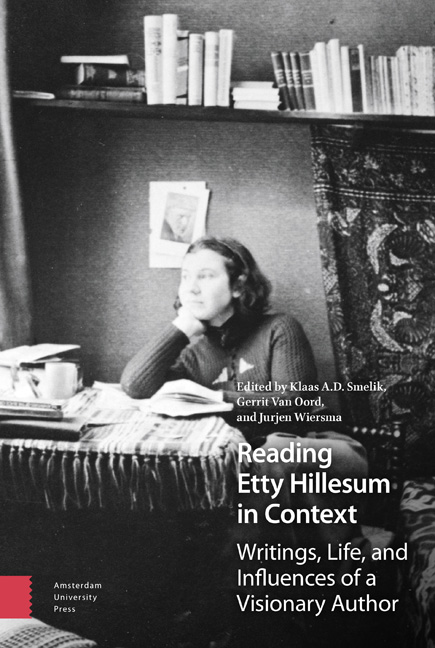1 - A Short Biography of Etty Hillesum (1914-1943)
Published online by Cambridge University Press: 06 January 2021
Summary
Abstract
In this introductory contribution, the author presents an overview of what is currently known about Etty Hillesum's life, study, family, and friends.
Keywords: biography, Julius Spier, Camp Westerbork, literary legacy, Etty Hillesum, Hillesum family, diaries and letters
Esther (Etty) Hillesum was born on 15 January 1914 in her parents’ home at Molenwater 77 in Middelburg, the capital of Zeeland, where her father Levie (Louis) Hillesum had been teaching classical languages (Greek and Latin) since 1911. In Amsterdam, on 7 December 1912, he had married Etty's mother, Riva (Rebecca) Bernstein, who went with him to Middelburg. Etty's father was born in Amsterdam on 25 May 1880, to the merchant Jacob Samuel Hillesum and his wife Esther Hillesum-Loeza; Etty, therefore, was named after her paternal grandmother. The family lived at the time at Sint Antoniesbreestraat 31, Amsterdam. Louis Hillesum studied classical languages at the University of Amsterdam. In 1902, he took his bachelor’s, followed in 1905 by his master's (both degrees cum laude). On 10 July 1908, he defended his thesis De imperfecti et aoristi usu Thucydidis (also awarded cum laude).
Middelburg was his first teaching assignment. In 1914, he began teaching classical languages at the Hilversum Gymnasium [Grammar School], but, due to deafness in one ear and impaired vision, had trouble maintaining order in the large classes at that institution. That is why, in 1916, he moved to the smaller Gymnasium in the town of Tiel in the middle of the Netherlands. In 1918, he became teacher of classics and deputy headmaster in Winschoten in the north-eastern part of the Netherlands. In 1924, he was appointed to similar positions at the Gymnasium in Deventer, where he became headmaster [Dutch: rector] on 1 February 1928. He remained there until his forced dismissal on 29 November 1940, at the request of the German occupier.
Louis Hillesum has been described as a small, quiet and unobtrusive man, a stoic, scholarly recluse with a great deal of humour and erudition. In the lower forms, he had at first experienced serious difficulties maintaining order and in response became an extremely strict teacher. In the higher forms, however, he came into his own. Although interested in Judaism, Louis Hillesum was highly assimilated; he worked, for example, on Saturdays.
- Type
- Chapter
- Information
- Reading Etty Hillesum in ContextWritings, Life, and Influences of a Visionary Author, pp. 23 - 30Publisher: Amsterdam University PressPrint publication year: 2018



